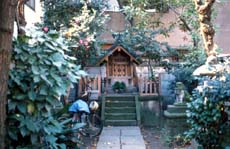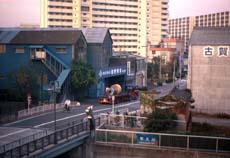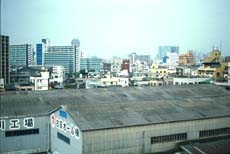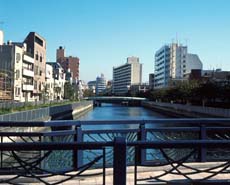index
The Koto-ku Kami
click on images for full-size:





Small Shinto shrine in Koto-ku

Industrial buildings and high-rise housing in Koto-ku

View over Koto-ku

Gentrifying buildings along the canal in Koto-ku
When the local spirit appeared to me she said that she was a little tired of having to look out at the dull architecture of the surrounding buildings, so couldn't I do something to spruce them up. I said that as a foreigner I didn't think I would have much leverage. She said that the native inhabitants were so busy asking for favors when they came by that she never had a chance to get a word in about the architectural quality of her neighborhood. "You have no idea what it's like to have to spend your time worrying about traffic tickets and high school examinations -- every day fifteen more examinations, and as the neighborhood gentrifies the new people keep bringing more requests about their cars." "It's not easy," she said, "when you were brought up to be concerned about crops and fishing, and when they didn't bother you much except for the festival days." "On the other hand," she admitted, "I suppose that without the examinations and the traffic accidents I'd have nothing to do but sit and look at those dreadful concrete buildings. You should have seen this place when it was a seaside village: waves, grasses waving in the wind, boats with shining sails out in the bay where there is all that ugly landfill now, children playing around the midden. We nature deities are not really suited to a hectic urban life." I pointed out that the inhabitants of the fishing village originally on this spot had not lived as long or healthily as their modern descendants. "Look around you," she said, "is this living? Packing into that subway or getting stalled on that hideous highway on stilts? And where are the natural rhythms and cycles of life in this city that never sleeps? We fertility gods know a lot about natural cycles." You're missing my point, I replied, which is that it is important for people to get beyond natural cycles and become more self-aware. "Sure," she scoffed, "modern self-development and self-assertion. Where does it get you? Rushing around, no community ties -- even here they are weaker than they were -- profit and greed." Modern self-development can get you, I argued, to a place where natural cycles are still honored but no longer dominate, a place where community can reconstruct itself to be fairer and easier, but still supportive. "And can you show me that place?" she asked? No, but we're working on it, I replied. "That's just the point," she said, "some of you are working on it, but a lot of my people are just suffering from the current state of things around here. And even if you achieved what you are trying to do, would they be part of it? What would they have to do? Move to the suburbs?"
- [Return to "Visiting the Kami"]
- [Nearby: Index -- Hong Kong versus Tokyo -- That waterfall in Roslyn ]